Elsewhere in this issue you will find the live-streaming video of this historical event. You are strongly encouraged to watch that first. What follows is a game review by Björn Thalén, who was also one of the producers of this project and the expert commentator during the broadcast.
We had invited 7 of the top Swedish players and it was a lot of merited people that showed up, setting the stage for what would be a great game of Diplomacy.
One player stabbed already before the start by not showing up (he’s fine and he had a good reason) so in the last minute we had to find a replacement. Luckily a winner of the morning game was available and thus Leif Bergman was replaced with Björn Sörling.
Then there was the country bidding. Each player got 100 points to distribute, you got a country by bidding most points on it but the most popular country also got the worst tiebreaker (meaning playing a popular country you would place after someone with the same center count in the end) so there surely was some tactical decisions to make here.
Both Tommy Larsson and Niclas Perez decided to go all-in and bid a 100 for their favorite country (England and Austria respectively) and that turned out to…
No wait. I’ll not spoil the result of the game just yet, instead we will go through the game in chronological order.
If you want to follow the game closer, we used a mapping software called jDip. You can download the complete game with every move here and then use the same software to follow the game move by move.
Alright now we can get started.
Country Bidding Results
Peter Lund: E-20, F-2, G-3, A-4, I-71
Tommy Larsson: E-100
Niclas Perez: A-100
Tage Bengtsson: I-99, E-1
Emily Bache: E-6, G-82, A-6, I-6
Dennis Andersson: R-39, G-38, I-23
Björn Sörling: T-30, I-42, A-28
Total sum for each country:
Italy (Tage) – 251
Austria-Hungary (Niclas) – 138
England (Tommy) – 127
Germany (Emily) – 123
Russia (Dennis) – 39
Turkey (Björn) – 30
France (Peter) – 2
Opening Game 1901-1903
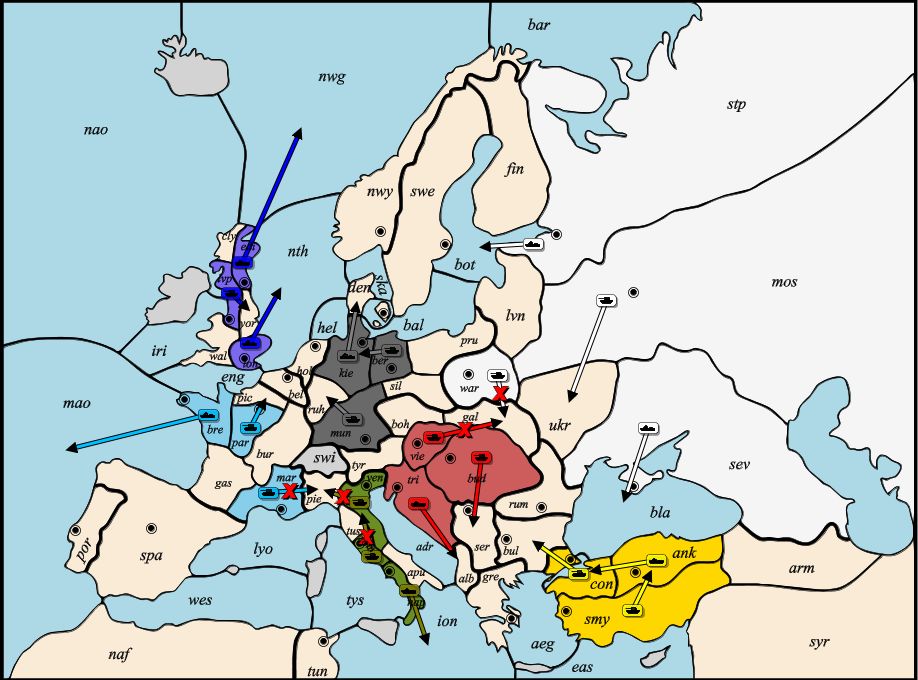
The first move as expected didn’t give us many surprises, but the one notable thing was the Russian fleet getting into Black Sea. This looks like a juggernaut coming, and the lack of upset reaction from the Turkish player made it even more so. We knew that this wasn’t at all agreed on and Turkey made the Bosporus opening in a hope of a juggernaut but not one with Russia in Black Sea. And it sure looked that way so Tommy could use it to convince France to be friendly and Germany to go for Russia from the start.
Speaking of the west it was very friendly openings, leaving both the Channel and Burgundy open. The weird looking bounce in Piedmont was prearranged and more along the line of ‘well we don’t have much useful to do with those armies anyway’. Italy choosing to do the Alpine Chicken opening was a signal that he didn’t really consider Turkey as a threat.
The 1901 Fall was mainly just a natural progression from the openings. Turkey and Russia weren’t able to become friends again, and Russia chose to stay in Black Sea, while Turkey went aggressively anti-Russian with an Armenian move followed up with building a fleet in Ankara. I think that after 1901 we could already see that neither Russia nor Turkey would have much hope of winning this game as Italy and Austria played a very safe alliance, safe in the way that they safely protected against a stab a lot, slowing their progress, but still an alliance. And in that situation having 4 fleets locked up in Black Sea is not a good thing for RT.
In the west nothing much happened in the Fall move, a prearranged bounce in Belgium to not have Germany grow too big, and England convoying into Norway, but not going to Barents so as not to scare the Russian. The big thing here however was Winter 01 where Germany decided to build 2 armies. This was the best present England could ever hope for, and indeed the Germany 01 builds I think are usually the most telling of any moves in Diplomacy if you want to predict the game outcome.
The rest of the opening game followed pretty clear lines. England and Germany had a great alliance going, England knew that Germany couldn’t stab England without any fleets and so could focus all his units in making progress both in Scandinavia and against France, and Germany also knew she couldn’t stab England and therefore didn’t have much choice but doing what she already did. France played a great defense though and while Russia soon was driven out of Scandinavia and even lost Warsaw to a wandering German army, it wasn’t before Italy joined the assault that France lost a single center to the alliance.
In the east on the other hand Austria and Italy continued their ‘I don’t really trust you but let’s try to cooperate a bit’-alliance, but with Turkey boxing up and even coming to terms with Russia there wasn’t much progress since none of them were willing to take risks and trust their alliance partner.
When starting the midgame, we were in this position.
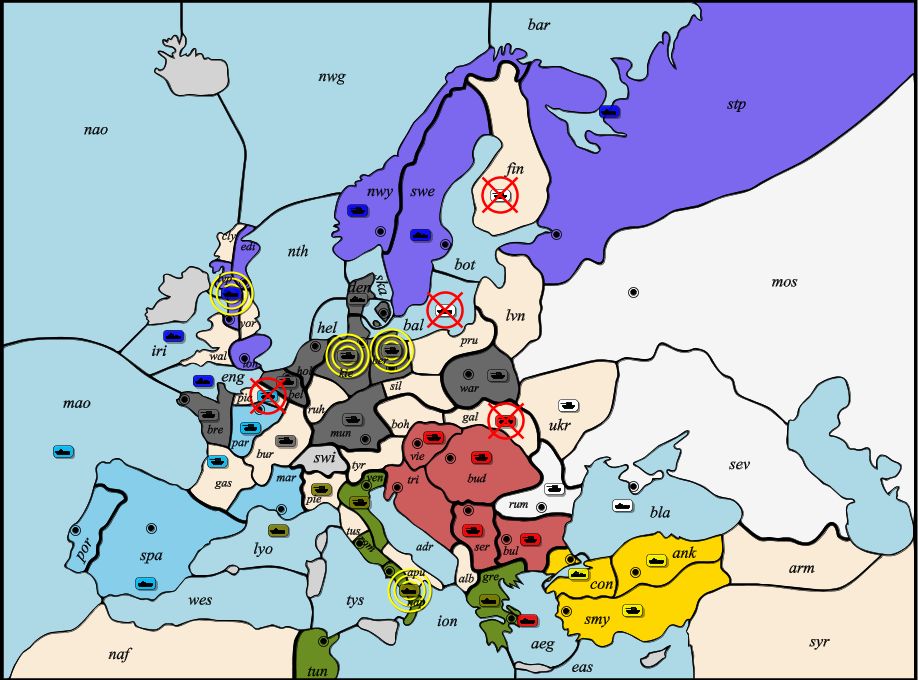
Mid-game 1904-1905
In this part of the game Germany and England kept their alliance going, France was still playing excellent defense and even regained Brest, but at the expense of losing Portugal. It was clear for almost everyone that England was in a great position since he could autonomously pick the moment to stab Germany and go for the win. This was also very clear to Germany who stated this in the mid-session interview after 04 but it wasn’t too much she could do about it, rather than hoping it would come later rather than sooner and if enough progress had been made that could lead to a good placing anyway.
In the east it started out like more of the same; Italy got Greece and the AI alliance continued to not make any progress against a boxed up Turkey and a struggling Russian who however managed to keep Moscow by pure diplomatic skills convincing EG it was better for them to not have Russia disband units. Seeing how this was going nowhere, again on a Russian initiative they agreed for a (short-lived) AIR-alliance that would do the unboxing of Turkey and splitting up Turkey with one SC each. This is more or less also what happened and Turkey couldn’t do much about it when Russia as well joined in on the attack.
In the end of 1905 the positions in the game had become a bit stale, far from being stalemated but the fact that only 3 units actually moved in Fall 1905 (the rest bouncing or supporting) showed that if keeping the current alliances nothing much would really happen (except Turkey being eliminated by AIR).
The year of the stab – 1906
So when a game stall out like this some players might be looking for a draw. Playing to 1908 c-diplo style this really isn’t an option and being high quality players looking to win or place as good as possible this was instead the signal to start off the fireworks.
In 1906 England stabbed Germany, Italy stabbed both France and Austria, Austria in turn was attacking both Germany and Russia, and Russia would probably have loved to stab Turkey but Turkey was out of trust for the bear and decided to go on a northern campaign for exile survival.
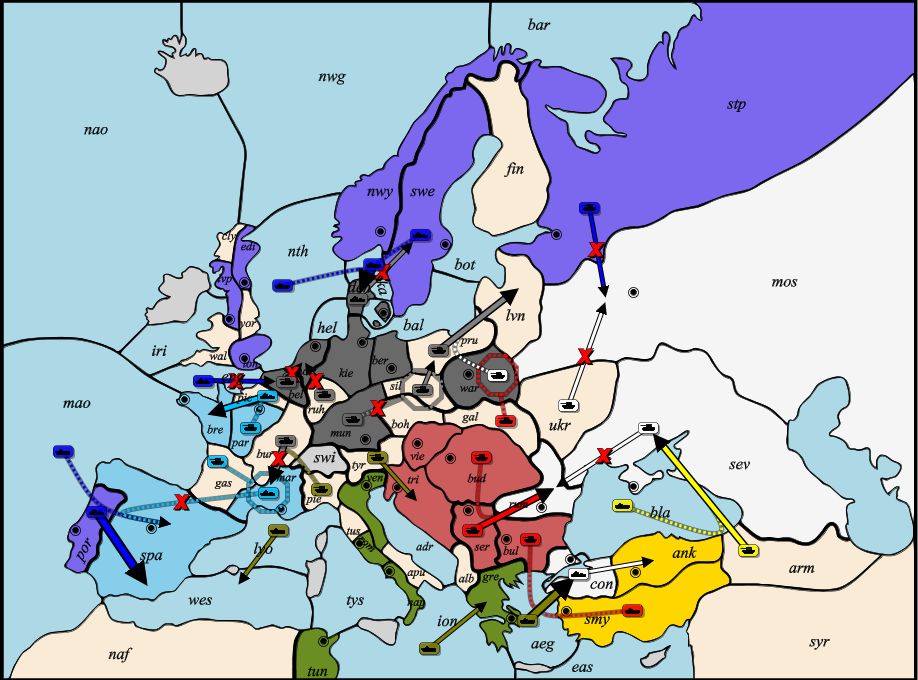
If we look at the England stab, there is some subtle beauty in it, first of all the timing, where he could see that Germany would likely loose Warsaw to AR if England wasn’t there to help, but even more the patience. Looking at this Fall 1906 move we can see that England had the option to go for either Belgium or Holland but decided to go for neither reasoning that it was more important to be standing in both North Sea and the English Channel than getting a third build.
The Italian stab on Austria was a bit half-hearted, I think that not going Pie-Tyr in this move was a clear factor that kept Austria in the game as good as they did. Together with the most important misorder of the day (15 minutes rolling deadline is very tight and there were more misorders, but this one the most crucial) where Italy failed to build an army in Venice made it so Italy couldn’t really compete for the victory anymore.
The Turkish northern venture was a great move for survival, realizing he had to find a center that someone could support him to hold it, and the only player with an interest in that would be England, so let’s go for Moscow.
Austria on the other hand I think also played into England’s hands a bit when deciding to help Russia against Germany. Again I think it was a missed opportunity for a harder hitting stab in this very year. (He still did a stab, of course, Romania is an Austrian center after all now, isn’t it?).
The end-game 1907 – 1908
In high level diplomacy the diplomacy certainly changes in the last years. There really isn’t much room for alliances in the traditional sense that ‘I help you with this now and then you can help me with that’ but that doesn’t make the diplomacy less important. What is left is ‘You help me with this now and that will hurt your bigger enemy/the guy you’re jockeying for position against.’ Finding these situations and convincing players that this direct move is of their interest is certainly something some players seems to have perfected.
That said, the biggest thing in the end-game is the tactical battle and especially it was a question of ‘how well could France and Germany defend against England’ and who would win the Austrian-Italian war. The result was an excellent defense played by Germany, losing only one center to the very patient attack of England. France as well did their best to hold off England completely and got some help from Italy, but still also had to surrender one center. The tactical game of France in this game overall however was very impressive, fighting off first an EG alliance for a long time, then even had Italy jump him at the opportunity and finally defending against the winning England and still manage to not only survive but keep 3 centers until the end.
In the east the result of the end-game was also a ‘tie’ with Italy and Austria trading two centers but none of the combatants gaining any of the other. Italy’s lead together with Austria also having to face a Russian on the other front led Italy to claim the second place, but still left Austria at third. In this tactical battle I want to point out to some subtle but excellent moves in Spring 07.
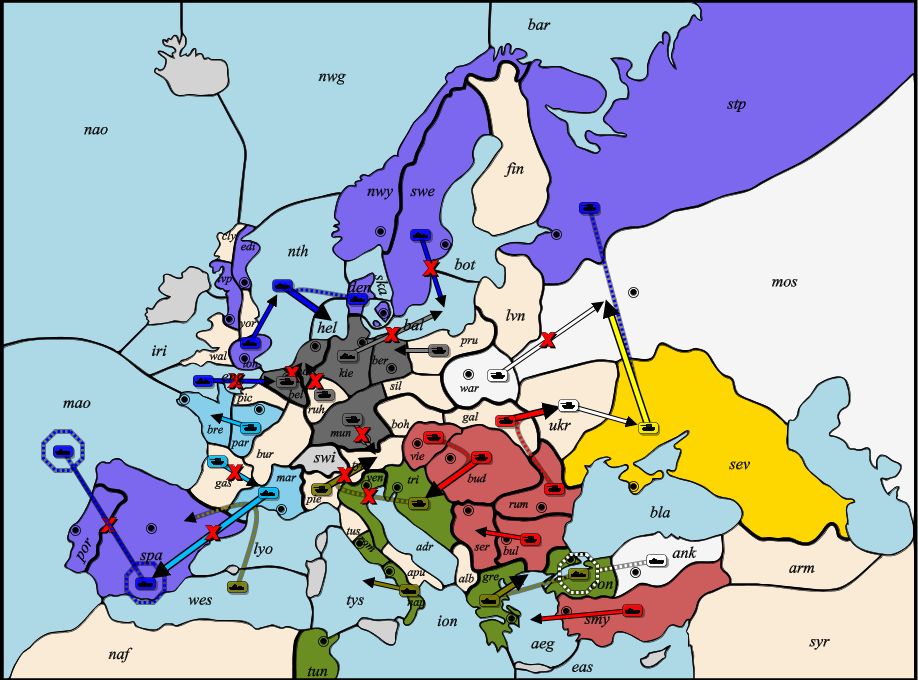
The first is Germany moving to Baltic. We can see that the Danish fleet can either support into Helgoland or Baltic and not both and it might look like a guess for where to try to bounce. But I think that both England and Germany concluded that Helgoland was the more important spot, and therefore Germany bounced England in Baltic. England could have second-guessed this, but I think it goes well with his conservative style to not try to be cute but take the safe gain, no matter the bounce in black shows the quality of those tacticians.
The other thing is the Austrian move Smy-Aeg. Moving out of a center with the enemy standing next to it, is by no means obvious, but in this case Austria made the (probably very correct conclusion) that the upside of getting Greece was much bigger than trying to defend a hard-defended Smyrna. I think however that Italy actually could have tried the ‘hero-move’ of Con-Aeg bouncing Austria and probably end up +1 in the end. How can this be reasonable? Well it is a very high-risk move, that is true, since the ‘obvious move’ for Austria is to go ‘Smy-Con’ but the support itself isn’t doing much then (and getting into Bulgaria was more of a nice surprise) and I think it would be very reasonable to ask Russia to go into Con. Then the worst case for you (and best for Russia) is that Russia gets in there, and that is not even necessarily bad for you, with Russia not building on your front and not being able to defend it next year anyway. And in the likely case you bounce Austria in Aeg, or Russia bounces Russia in Con, all is well. Only problem of course is if Russia agrees and then tells the plan to Austria, but a last minute tip would probably have worked.
The end
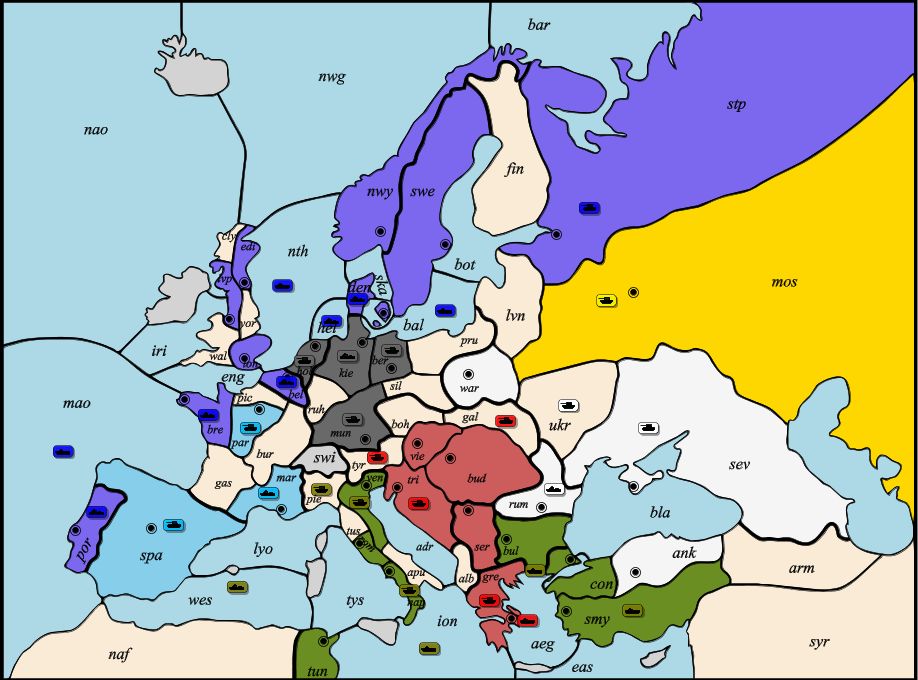
The final score was:
Tommy Larsson (England) – 10sc
Tage Bengtsson (Italy) – 7sc
Niclas Perez (Austria) – 5sc
Dennis Andersson (Russia) – 4sc
Emily Bache (England) – 4sc
Peter Lund (France) – 3sc
Björn Sörling (Turkey) – 1sc
Congratulations to Tommy for taking home the First Swedish Diplomacy Invitational. Hopefully this will only be the start of a series of invitationals here in Sweden, and even though we are very happy about the production we managed to perform, we also have a hundreds ideas on how to improve this even more. If you have any comments, please send them to the address in my signature.
If you wish to e-mail feedback on this article to the author, and clicking on the envelope above does not work for you, feel free to use the "Dear DP..." mail interface. |


